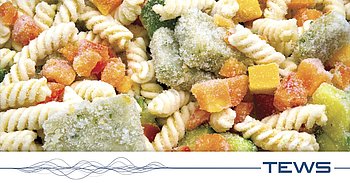How our Microwave Technology can Measure Moisture in Frozen Pasta

- High accuracy
- High quality
- High moisture range
- Precise results
So why is it important to know the exact moisture level of the pre-cooked pasta?
The answer to this lies in the texture of the pasta. Based on the moisture, it changes. In order to be able to offer the customer a consistent taste experience ("al dente" 😉), the moisture should always be approximately the same. Our microwave technology can ensure this.
So how does this work?
In the food sector, the moisture range is usually between 0.5% and 18%:
In the past, it was unusual to measure in a moisture range above 20 percent. Recently, when performing reference measurements with cooked noodles in the laboratory and measuring them with a laboratory and planar sensor, we discovered something exciting:
The moisture range of the blanched pasta was around 60% and surprisingly our measurement technology was able to deliver accurate readings . This shows that our microwave resonance technology can also measure with good accuracy in this high moisture range.
The TEWS microwave resonance method is an indirect measurement technique. For more information about or technology click here: Tews: TEWS Microwave Technology .
Usually, we are working with an increasing slope of the so-called calibration curve which connects the TEWS microwave value with the reference moisture results of direct measuring methods like Karl Fischer or LOD. That means the higher the moisture of the product the higher is our microwave value. With the blanched pasta the relation was opposite: the higher the moisture values of the product are, the lower is our MW value - thus the calibration curve is falling.
The correlation of 0.942 is very high and the standard deviation of 0.7 is very good for this high moisture range. The calibration contains 38 values and is not only based on a few random measurements.
Is measuring moisture of frozen products a topic that is interesting for your field of work? Then contact our specialist Knut Szemjonneck for detailed consultation on our moisture measurement technology or for more interesting facts about this topic.
To have more information, please contact: Knut Szemjonneck, Global Key Account Manager Food / Feed, +49 160 9961 3202, knut.szemjonneck@tewsworks.com